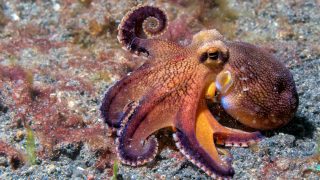
Opposing the Cultivation and Trade of Octopus Produced through Unethical Strategies (OCTOPUS) Act (Federal)
S.1947
The Opposing the Cultivation and Trade of Octopus Produced through Unethical Strategies (OCTOPUS) Act would ban commercial octopus farming in the U.S. and prohibit imports of farmed octopus from foreign countries.
Status
The Animal Legal Defense Fund supports this bill.
Sponsors: Sens. Sheldon Whitehouse (D-RI) and Lisa Murkowski (R-AK)
Introduction Date: July 25, 2024
The Opposing the Cultivation and Trade of Octopus Produced through Unethical Strategies (OCTOPUS) Act (S.1947) would ban commercial octopus farming in the U.S. and prohibit the import of farmed octopus into the U.S. from foreign countries. More specifically, the bill would:
- prohibit commercial octopus aquaculture operations in the U.S.;
- prohibit the import of commercially farmed octopus, or products containing commercially farmed octopus, and impose fines for violations;
- require importers to certify that they are not importing farmed octopus; and
- require the National Oceanic and Atmospheric Administration (NOAA) to collect data on octopus harvest methods in trade programs under its jurisdiction.
Octopuses are widely known to be highly intelligent animals, famous for escaping their aquariums, and require complex environments for mental stimulation. A recent scientific review found strong evidence of sentience in octopuses, meaning they can have feelings such as pain, pleasure, distress, and excitement.
Octopuses are solitary, territorial creatures, and are known to react poorly in captivity with other octopuses, leading to cannibalism or even self-cannibalism, in which they eat their own arms. On farms, octopuses would be cruelly overcrowded into small pools together, causing significant stress, aggression, and high mortality. Octopuses’ soft bodies and skin can easily be injured in an enclosed setting when jetting away from objects to escape perceived threats. Common slaughter practices for octopuses are highly cruel, including freezing and clubbing them to death.
On the state level, similar legislation has been passed into law in Washington state and introduced in Hawaii and California.
Help Ban Cruel Octopus Farming in the U.S.
Urge your U.S. Senators to co-sponsor the OCTOPUS Act, which would ban commercial octopus farming in the U.S. and prohibit imports of farmed octopus from foreign countries.
Why is this legislation important?
Although octopuses are not currently farmed for human consumption at a commercial scale, a planned facility in Spain has been awaiting environmental permits since 2021 and is expected to begin construction soon. The facility, run by a company called Nueva Pescanova, would produce 3,000 tons of octopus meat annually, requiring the slaughter of about one million octopuses. Nueva Pescanova claims that farming would reduce the “need” for wild-caught octopus, but it is more likely that a supply of farmed octopus would only increase global demand and lower market prices. In addition, octopuses must eat three times their body weight to survive, which means that octopus farming may increase pressure on already-depleted fish populations, especially in the Global South.
For more information about federal animal protection legislation and opportunities to take action for animals, visit aldf.org/legislation.
Sign Up to Get Updates on This Campaign
Join the Animal Legal Defense Fund's email list to stay up to date on this and other campaigns affecting animals.



